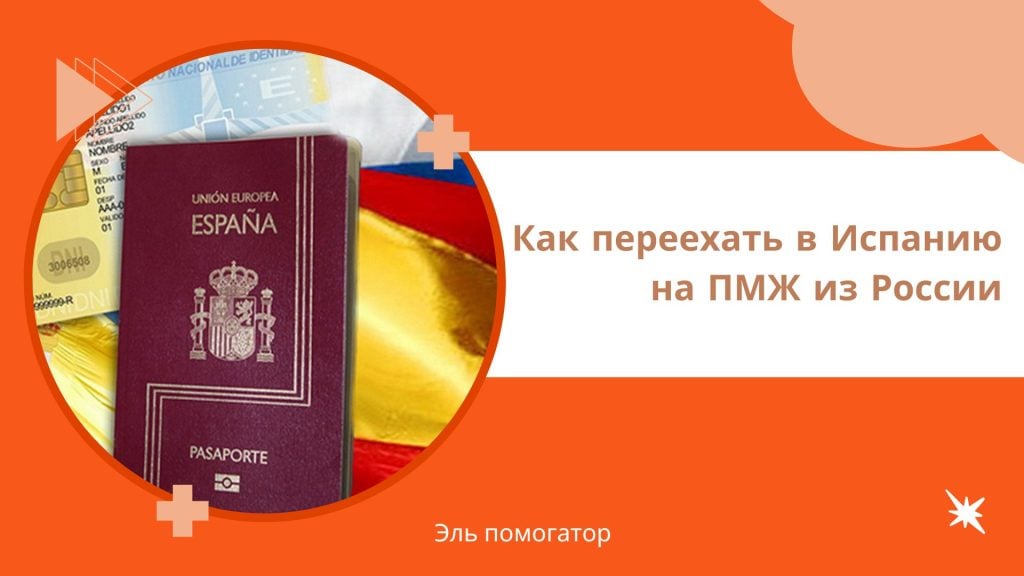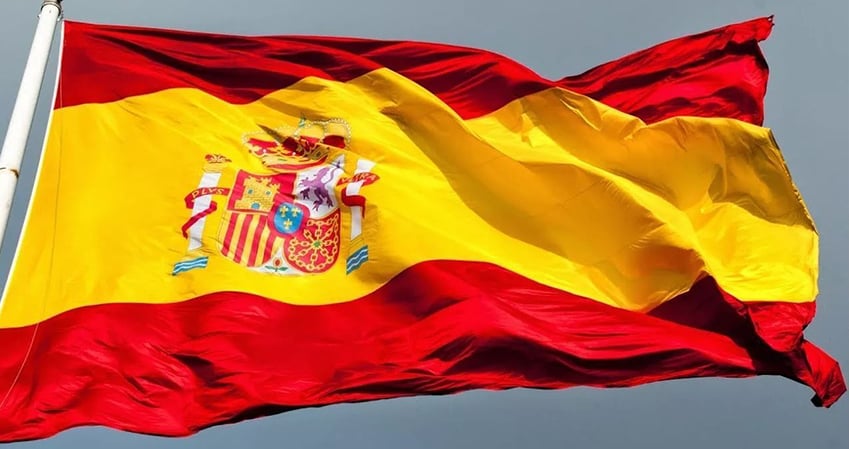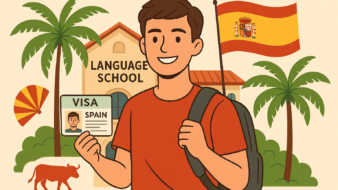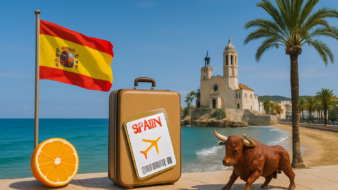Переезд в Испанию под ключ от 6 недель
Поможем оформить ВНЖ Испании для всей семьи с минимальной налоговой нагрузкой!
Подробнее
Получить бесплатную консультацию
От 0 €
В месяц налоговая нагрузка
От 6 недель
Срок получения ВНЖ
5 лет
До постоянного ВНЖ


Как переехать в Испанию на ПМЖ из России

Испания для переезда из России – одна из самых популярных стран из-за многих факторов. Она славится мягким средиземноморским климатом, традициями. Здесь высокий уровень жизни, хорошие зарплаты и социальная защита. Испанцы приветливы и общительны, а менталитет способствует спокойной и размеренной жизни.
Государство предлагает хорошие условия для развития бизнеса, инвестирует в инновации и технологические проекты. Здесь активно развивается стартап-сектор, а обслуживание в клиниках находится на достойном уровне.
 Иммиграция в Испанию – захватывающее приключение. Она даст вам много новых возможностей. С чего начать переезд в Испанию на ПМЖ из России? В первую очередь надо выбрать программу иммиграции.
Существует несколько программ, позволяющих получить визу и обосноваться в стране. Если интересует, как получить гражданство в Испании, то выберите ту программу, которая поможет вам это сделать.
Иммиграция в Испанию – захватывающее приключение. Она даст вам много новых возможностей. С чего начать переезд в Испанию на ПМЖ из России? В первую очередь надо выбрать программу иммиграции.
Существует несколько программ, позволяющих получить визу и обосноваться в стране. Если интересует, как получить гражданство в Испании, то выберите ту программу, которая поможет вам это сделать.
 No Lucrativa – вид на жительство без права на работу. Это разрешение действует более 12 лет и регламентирована указом короля. «Но Лукратива» могут получить те, кто иммигрировал не из Евросоюза. Для ее оформления не обязательно приобретать жилье, открывать бизнес или вкладывать крупные суммы.
Как получить ПМЖ в Испании гражданину России с помощью «Но Лукратива»? Основное требование – арендовать недвижимость и доказать наличие стабильного дохода за пределами Испании, поскольку запрещено работать на ее территории.
Преимущества No Lucrativa:
No Lucrativa – вид на жительство без права на работу. Это разрешение действует более 12 лет и регламентирована указом короля. «Но Лукратива» могут получить те, кто иммигрировал не из Евросоюза. Для ее оформления не обязательно приобретать жилье, открывать бизнес или вкладывать крупные суммы.
Как получить ПМЖ в Испании гражданину России с помощью «Но Лукратива»? Основное требование – арендовать недвижимость и доказать наличие стабильного дохода за пределами Испании, поскольку запрещено работать на ее территории.
Преимущества No Lucrativa:
 Многих интересует, как уехать в Испанию на ПМЖ из России с помощью приобретения недвижимости. Вступившая в силу в октябре 2013 г. Golden Visa (ВНЖ на основании программы «Золотая виза Испании», которая предоставляет возможность жить и работать в стране, без проблем передвигаться по Шенгенской зоне) также все еще актуальна.
Ее преимущества:
Многих интересует, как уехать в Испанию на ПМЖ из России с помощью приобретения недвижимости. Вступившая в силу в октябре 2013 г. Golden Visa (ВНЖ на основании программы «Золотая виза Испании», которая предоставляет возможность жить и работать в стране, без проблем передвигаться по Шенгенской зоне) также все еще актуальна.
Ее преимущества:
 Релоканты, желающие работать за границей, могут получить приглашение от работодателя. Руководитель компании должен показать министерству труда отсутствие подходящих кандидатов на местном рынке труда.
Квалифицированные работники получают голубую карту. При этом их профессия должна быть востребованной. К таковым отраслям причисляют:
Релоканты, желающие работать за границей, могут получить приглашение от работодателя. Руководитель компании должен показать министерству труда отсутствие подходящих кандидатов на местном рынке труда.
Квалифицированные работники получают голубую карту. При этом их профессия должна быть востребованной. К таковым отраслям причисляют:
 Если интересует, как уехать жить в Испанию из России с нуля, то стоит рассмотреть этот вариант. С момента принятия соответствующего закона в 2013 г. стало возможным получить стартап-визу. Для этого первым делом подготавливается и согласовывается бизнес-план. Желательно, чтобы он был составлен на испанском, однако также допускается использование английского языка.
Затем нужно собрать документы и подать заявление в испанскую комиссию по стартапам, которая называется ENISA. Особое значение придают финансовым гарантиям заявителя, медицинской страховке и справке о несудимости с апостилем.
Преимущества:
Если интересует, как уехать жить в Испанию из России с нуля, то стоит рассмотреть этот вариант. С момента принятия соответствующего закона в 2013 г. стало возможным получить стартап-визу. Для этого первым делом подготавливается и согласовывается бизнес-план. Желательно, чтобы он был составлен на испанском, однако также допускается использование английского языка.
Затем нужно собрать документы и подать заявление в испанскую комиссию по стартапам, которая называется ENISA. Особое значение придают финансовым гарантиям заявителя, медицинской страховке и справке о несудимости с апостилем.
Преимущества:
 Чтобы понять, стоит ли переезжать в Испанию из России, нужно оценить все плюсы и минусы жизни в данной стране.
Стабильность экономики в последние годы привлекает международные инвестиции. Членство в Европейском Союзе обеспечивает доступ к широкому рынку.
Климат теплый и солнечный, инфраструктура также на высоте. Здесь отличные дороги, множество парковых зон и спортивных площадок.
Испанцы доброжелательны и гостеприимны, известны своей открытостью и готовностью помочь. Это облегчает адаптацию эмигрантов.
Здравоохранение оценено на международном уровне. Одно из отличий – акцент на профилактике заболеваний. Вакцинации и скрининговые обследования поддерживают население и повышают продолжительность жизни.
Основные недостатки:
Чтобы понять, стоит ли переезжать в Испанию из России, нужно оценить все плюсы и минусы жизни в данной стране.
Стабильность экономики в последние годы привлекает международные инвестиции. Членство в Европейском Союзе обеспечивает доступ к широкому рынку.
Климат теплый и солнечный, инфраструктура также на высоте. Здесь отличные дороги, множество парковых зон и спортивных площадок.
Испанцы доброжелательны и гостеприимны, известны своей открытостью и готовностью помочь. Это облегчает адаптацию эмигрантов.
Здравоохранение оценено на международном уровне. Одно из отличий – акцент на профилактике заболеваний. Вакцинации и скрининговые обследования поддерживают население и повышают продолжительность жизни.
Основные недостатки:
 Из-за введенных ограничений было разработано множество альтернативных маршрутов с пересадками. Такие варианты значительно сокращают время путешествия.
Один из самых популярных маршрутов – перелет через Сербию. Другой вариант – перелет через Турцию, Армению, Грузию или Азербайджан.
Из-за введенных ограничений было разработано множество альтернативных маршрутов с пересадками. Такие варианты значительно сокращают время путешествия.
Один из самых популярных маршрутов – перелет через Сербию. Другой вариант – перелет через Турцию, Армению, Грузию или Азербайджан.


 Основа системы – государственная служба здравоохранения. Финансируется она через налоги, что позволяет гражданам и официально зарегистрированным резидентам получать большинство услуг бесплатно или по крайне низким расценкам.
Широко развита и частная медицина. Цены на страховку зависят от возраста, состояния здоровья кандидата и выбранных опций полиса.
Превосходное качество медицины – результат ряда факторов: от современного оборудования и до передовых технологий. Больницы и исследовательские центры регулярно внедряют новейшие методы лечения, включая роботизированные операции и индивидуализированные протоколы медикаментозной терапии. Значительное внимание уделяется профилактике и ранней диагностике, что повышает шансы на успешное лечение.
Стоматологическая помощь не включена в систему бесплатного государственного страхования для взрослых, поэтому большинство пациентов обращаются к частным врачам или оформляют страховки. Цены зависят от расположения клиники (в столице или провинции), сложности процедуры и используемых материалов.
Основа системы – государственная служба здравоохранения. Финансируется она через налоги, что позволяет гражданам и официально зарегистрированным резидентам получать большинство услуг бесплатно или по крайне низким расценкам.
Широко развита и частная медицина. Цены на страховку зависят от возраста, состояния здоровья кандидата и выбранных опций полиса.
Превосходное качество медицины – результат ряда факторов: от современного оборудования и до передовых технологий. Больницы и исследовательские центры регулярно внедряют новейшие методы лечения, включая роботизированные операции и индивидуализированные протоколы медикаментозной терапии. Значительное внимание уделяется профилактике и ранней диагностике, что повышает шансы на успешное лечение.
Стоматологическая помощь не включена в систему бесплатного государственного страхования для взрослых, поэтому большинство пациентов обращаются к частным врачам или оформляют страховки. Цены зависят от расположения клиники (в столице или провинции), сложности процедуры и используемых материалов.
 Прежде чем приступить к поиску работы для русских в Испании, надо ознакомиться с уровнями зарплат. Минимальная плата в 2024 г. составляет 1134 €. Средняя зарплата зависит от города и отрасли. К самым высокооплачиваемым относят:
Прежде чем приступить к поиску работы для русских в Испании, надо ознакомиться с уровнями зарплат. Минимальная плата в 2024 г. составляет 1134 €. Средняя зарплата зависит от города и отрасли. К самым высокооплачиваемым относят:
 Понадобится загранпаспорт, NIE, доказательства резидентства и источника дохода. Банки предъявляют и индивидуальные требования, зависящие от вида счета, который клиент хочет открыть. Для нерезидентов зачастую требуется обновлять статус каждые 24 месяца и предоставлять информацию о доходах.
Открытие счета для граждан РФ вызывает сложности. Ввиду политических и экономических санкций некоторые банки отказывают россиянам.
Комиссии за переводы – одна из ключевых статей расходов. Внутренние переводы менее затратны, а международные достигают значительных сумм.
Ипотека представляет интерес не только для местных, но и для релокантов. Иностранцу нужно доказать свою платежеспособность и иметь хорошую кредитную историю.
Процентные ставки зависят от типа кредита, продолжительности срока выплаты и текущих экономических условий. В среднем они составляют от 2 до 3% годовых.
Понадобится загранпаспорт, NIE, доказательства резидентства и источника дохода. Банки предъявляют и индивидуальные требования, зависящие от вида счета, который клиент хочет открыть. Для нерезидентов зачастую требуется обновлять статус каждые 24 месяца и предоставлять информацию о доходах.
Открытие счета для граждан РФ вызывает сложности. Ввиду политических и экономических санкций некоторые банки отказывают россиянам.
Комиссии за переводы – одна из ключевых статей расходов. Внутренние переводы менее затратны, а международные достигают значительных сумм.
Ипотека представляет интерес не только для местных, но и для релокантов. Иностранцу нужно доказать свою платежеспособность и иметь хорошую кредитную историю.
Процентные ставки зависят от типа кредита, продолжительности срока выплаты и текущих экономических условий. В среднем они составляют от 2 до 3% годовых.
Вернуться к блогу
Актуальные программы иммиграции
 Иммиграция в Испанию – захватывающее приключение. Она даст вам много новых возможностей. С чего начать переезд в Испанию на ПМЖ из России? В первую очередь надо выбрать программу иммиграции.
Существует несколько программ, позволяющих получить визу и обосноваться в стране. Если интересует, как получить гражданство в Испании, то выберите ту программу, которая поможет вам это сделать.
Иммиграция в Испанию – захватывающее приключение. Она даст вам много новых возможностей. С чего начать переезд в Испанию на ПМЖ из России? В первую очередь надо выбрать программу иммиграции.
Существует несколько программ, позволяющих получить визу и обосноваться в стране. Если интересует, как получить гражданство в Испании, то выберите ту программу, которая поможет вам это сделать.
Студенческая виза
Программа позволяет студентам стать частью образовательной среды. Для начала нужно поступить в одно из учебных заведений страны. После этого студент подает заявку в консульство или посольство. Потребуются также:-
- документы о зачислении;
- средства в достаточном количестве для проживания;
- медстраховка.
Пассивный доход / Финансовая независимость (No Lucrativa)
 No Lucrativa – вид на жительство без права на работу. Это разрешение действует более 12 лет и регламентирована указом короля. «Но Лукратива» могут получить те, кто иммигрировал не из Евросоюза. Для ее оформления не обязательно приобретать жилье, открывать бизнес или вкладывать крупные суммы.
Как получить ПМЖ в Испании гражданину России с помощью «Но Лукратива»? Основное требование – арендовать недвижимость и доказать наличие стабильного дохода за пределами Испании, поскольку запрещено работать на ее территории.
Преимущества No Lucrativa:
No Lucrativa – вид на жительство без права на работу. Это разрешение действует более 12 лет и регламентирована указом короля. «Но Лукратива» могут получить те, кто иммигрировал не из Евросоюза. Для ее оформления не обязательно приобретать жилье, открывать бизнес или вкладывать крупные суммы.
Как получить ПМЖ в Испании гражданину России с помощью «Но Лукратива»? Основное требование – арендовать недвижимость и доказать наличие стабильного дохода за пределами Испании, поскольку запрещено работать на ее территории.
Преимущества No Lucrativa:
-
- ВНЖ выдается сразу на год;
- не требуется приобретение собственности;
- быстрое оформление;
- можно переехать с супругой (ом) и несовершеннолетними детьми;
- безвизовый доступ в ЕС.
-
- отсутствие возможности работать; обязательное подтверждение обеспеченности; минимальный срок пребывания – не менее 6 месяцев в году; бюрократические процедуры;
-
- возраст от 18 лет;
- отсутствие опасных заболеваний, долгов по налогам и судимостей;
- не нарушать визовый режим, а также не быть под их санкциями в ЕС.
-
- подготовить анкеты и осуществить оплату пошлин;
- получить (вклеить) национальную визу в загранпаспорт;
- пересечь границу (подразумевается въезд со сроком на 90 суток).
Недвижимость и другие инвестиции
 Многих интересует, как уехать в Испанию на ПМЖ из России с помощью приобретения недвижимости. Вступившая в силу в октябре 2013 г. Golden Visa (ВНЖ на основании программы «Золотая виза Испании», которая предоставляет возможность жить и работать в стране, без проблем передвигаться по Шенгенской зоне) также все еще актуальна.
Ее преимущества:
Многих интересует, как уехать в Испанию на ПМЖ из России с помощью приобретения недвижимости. Вступившая в силу в октябре 2013 г. Golden Visa (ВНЖ на основании программы «Золотая виза Испании», которая предоставляет возможность жить и работать в стране, без проблем передвигаться по Шенгенской зоне) также все еще актуальна.
Ее преимущества:
-
- разрешается заниматься предпринимательством;
- гибкие условия пребывания;
- резидентство для детей и супруга (и);
- оформление гражданства спустя 10 лет и ПМЖ спустя 5 лет;
- медобслуживание;
- покупка и регистрация транспортного средства в Евросоюзе;
- обучение в школах и вузах.
-
- большой первоначальный взнос;
- риски рынка (случаются колебания из-за мировых событий);
- расходы на содержание (собственники обязаны платить налоги за содержание имущества ежегодно, а их размер зависит от кадастровой стоимости);
- нельзя оформить кредит (первоначальная сумма оплачивается в полном объеме).
-
- покупка недвижимости стоимостью от 500000 € и владение ею на протяжении всего срока действия ВНЖ;
- внесение 1000000 € на депозит или вложение денег в акции компании;
- реализация проекта, способствующего стимулированию экономического развития или внедрению инноваций.
Переезд для высококвалифицированных работников
 Релоканты, желающие работать за границей, могут получить приглашение от работодателя. Руководитель компании должен показать министерству труда отсутствие подходящих кандидатов на местном рынке труда.
Квалифицированные работники получают голубую карту. При этом их профессия должна быть востребованной. К таковым отраслям причисляют:
Релоканты, желающие работать за границей, могут получить приглашение от работодателя. Руководитель компании должен показать министерству труда отсутствие подходящих кандидатов на местном рынке труда.
Квалифицированные работники получают голубую карту. При этом их профессия должна быть востребованной. К таковым отраслям причисляют:
-
- IT;
- наука;
- химическое производство;
- инженерные специальности;
- машиностроение.
ВНЖ для цифрового кочевника
Что нужно, чтобы уехать в Испанию из России в качестве удаленного работника? В 2023 г. появился новый тип ВНЖ для цифровых кочевников для кандидатов, работающих удаленно. В таком случае также требуется профильное образование или рабочий стаж сроком от 3 лет. Преимущества:-
- свободное передвижение внутри Шенгенской зоны;
- через 5 лет можно оформить ПМЖ, а через 10 - гражданство;
- безвизовое посещение ЕС.
Стартап виза
 Если интересует, как уехать жить в Испанию из России с нуля, то стоит рассмотреть этот вариант. С момента принятия соответствующего закона в 2013 г. стало возможным получить стартап-визу. Для этого первым делом подготавливается и согласовывается бизнес-план. Желательно, чтобы он был составлен на испанском, однако также допускается использование английского языка.
Затем нужно собрать документы и подать заявление в испанскую комиссию по стартапам, которая называется ENISA. Особое значение придают финансовым гарантиям заявителя, медицинской страховке и справке о несудимости с апостилем.
Преимущества:
Если интересует, как уехать жить в Испанию из России с нуля, то стоит рассмотреть этот вариант. С момента принятия соответствующего закона в 2013 г. стало возможным получить стартап-визу. Для этого первым делом подготавливается и согласовывается бизнес-план. Желательно, чтобы он был составлен на испанском, однако также допускается использование английского языка.
Затем нужно собрать документы и подать заявление в испанскую комиссию по стартапам, которая называется ENISA. Особое значение придают финансовым гарантиям заявителя, медицинской страховке и справке о несудимости с апостилем.
Преимущества:
-
- не требуется демонстрация работающей модели бизнеса на первом этапе;
- законное проживание для заявителя и его семьи;
- минимальное количество бюрократических издержек.
-
- необходимость реализации бизнес-плана для дальнейшего продления ВНЖ;
- затруднения у предпринимателей, ведущих параллельный бизнес за границей или часто путешествующих;
- на счете должно быть от 30000 € для основного заявителя;
- подготовка качественного проекта потребует определенных усилий.
Преимущества и недостатки жизни в Испании
 Чтобы понять, стоит ли переезжать в Испанию из России, нужно оценить все плюсы и минусы жизни в данной стране.
Стабильность экономики в последние годы привлекает международные инвестиции. Членство в Европейском Союзе обеспечивает доступ к широкому рынку.
Климат теплый и солнечный, инфраструктура также на высоте. Здесь отличные дороги, множество парковых зон и спортивных площадок.
Испанцы доброжелательны и гостеприимны, известны своей открытостью и готовностью помочь. Это облегчает адаптацию эмигрантов.
Здравоохранение оценено на международном уровне. Одно из отличий – акцент на профилактике заболеваний. Вакцинации и скрининговые обследования поддерживают население и повышают продолжительность жизни.
Основные недостатки:
Чтобы понять, стоит ли переезжать в Испанию из России, нужно оценить все плюсы и минусы жизни в данной стране.
Стабильность экономики в последние годы привлекает международные инвестиции. Членство в Европейском Союзе обеспечивает доступ к широкому рынку.
Климат теплый и солнечный, инфраструктура также на высоте. Здесь отличные дороги, множество парковых зон и спортивных площадок.
Испанцы доброжелательны и гостеприимны, известны своей открытостью и готовностью помочь. Это облегчает адаптацию эмигрантов.
Здравоохранение оценено на международном уровне. Одно из отличий – акцент на профилактике заболеваний. Вакцинации и скрининговые обследования поддерживают население и повышают продолжительность жизни.
Основные недостатки:
- Знания языка. Хотя в туристических зонах говорят на английском, знание испанского существенно облегчает интеграцию в общество. Без языковых навыков сложно решать бюрократические вопросы, общаться с жителями.
- Большие расходы на коммунальные услуги. Электроэнергия, вода и газ дорогие. Это особенно актуально в столице.
- Завышенные цены на обучение. Государственные университеты предлагают относительно доступное образование, но для студентов-иностранцев стоимость выше. Многие вынуждены обращаться к кредитам или работать, чтобы покрыть расходы.
Как добраться и выбрать место для обустройства
Способы перелета в Испанию
 Из-за введенных ограничений было разработано множество альтернативных маршрутов с пересадками. Такие варианты значительно сокращают время путешествия.
Один из самых популярных маршрутов – перелет через Сербию. Другой вариант – перелет через Турцию, Армению, Грузию или Азербайджан.
Из-за введенных ограничений было разработано множество альтернативных маршрутов с пересадками. Такие варианты значительно сокращают время путешествия.
Один из самых популярных маршрутов – перелет через Сербию. Другой вариант – перелет через Турцию, Армению, Грузию или Азербайджан.
Выбор региона для проживания
Если задумываетесь о том, как остаться жить в Испании, то нужно заранее продумать такое место для обустройства, которое будет подходить вам оптимально.Для бизнесменов
Мадрид – важнейший экономический центр. Он славится разнообразием бизнес-услуг: от консалтинговых до логистических. Здесь расположены офисы крупных корпораций и госучреждений. Барселона известна динамичной бизнес-средой, инновационными стартапами и креативными агентствами. Архитектурные шедевры, прекрасные пляжи и богатая кухня делают ее популярным выбором среди деловых людей. Малага, расположенная на южном побережье, становится новым центром внимания для технологических и инновационных компаний. Кроме того, город обладает развитой инфраструктурой, включая современные офисные здания и ТЦ.Для семей
В Мадриде предоставляются возможности для исследовательской работы и обучения. Каталония славится высококачественными учреждениями. Наличие международных школ позволяет обучаться на различных языках, что делает регион привлекательным для иностранных семей. В Валенсии семьи с детьми могут рассчитывать на доступ к качественному образованию. Город известен своей безопасностью, огромным количеством зеленых зон и близостью к морю.Для поиска работы
Сеута – один из ключевых центров профессиональных возможностей. Особое экономическое положение и привлекательное налогообложение способствует развитию коммерции и логистики. Касерес, несмотря на небольшую площадь, предлагает много возможностей для карьеры. Основные отрасли – сельское хозяйство, питание и туризм. А исторические памятники и насыщенная культурная жизнь привлекают разнообразных специалистов. Власти Саморы активно стимулируют привлечение новых компаний, что создает благоприятные условия для трудоустройства. Основные сферы – промышленность и производство.Для пенсионеров
Мурсия, расположенная на юго-востоке, идеальна для людей, ищущих спокойствие и комфорт. Ее достоинства – чистый воздух и приемлемые цены на жилье. Аликанте представляет собой идеальную комбинацию удобств и природных красот. Этот город славится чистыми пляжами и приятным климатом. Авила, окруженная крепостными стенами, известна историческим наследием и спокойной атмосферой. Она привлекает своей безопасностью, чистотой и медленным ритмом.Покупка и аренда недвижимости

Процесс покупки недвижимости
Если у вас возникло желание “хочу в Испанию”, то следует заранее задуматься об аренде жилья или покупке собственной недвижимости. Существует разнообразие вариантов: от уютных апартаментов на побережье до роскошных вилл в престижных районах. Любители исторических мест чаще рассматривают объекты в Толедо или Севилье. Для тех, кто ищет активную городскую жизнь, отличным вариантом будет столица. При выборе обращают внимание на инфраструктуру области. Близость к школам, больницам, магазинам и транспортным узлам играет немаловажную роль. Если решено приобрести недвижимость, то потребуется идентификационный номер (NIE). Без него нельзя легально совершить покупку. Перед подписанием договора, рекомендуется тщательным образом проверить юридическое состояние жилья. Изучают Registro de la Propiedad (Реестр собственности), где хранится информация обо всех зарегистрированных объектах. Когда проверки завершены, приступают к заключению договора купли-продажи. В первую очередь производится выплата задатка, который удерживается в случае отказа от сделки. Затем подписывается договор. Нотариус подтверждает законность сделки. После подписания новый владелец должен уплатить налоги и сборы. Последний этап – регистрация права собственности.Аренда недвижимости
Процесс аренды обычно состоит из:-
- поиска места;
- заключения контракта с арендодателем или агентом;
- подписание бумаг.
Адаптация к жизни в Испании

Изучение испанского языка
Если зададите себе вопрос: что нужно, чтобы жить в Испании, то в первую очередь подумайте о знании языка. Изучение испанского – одно из важных условий успешной адаптации. Существуют различные онлайн-платформы, позволяющие начать изучение языка еще на родине. Наиболее популярные сайты: После прибытия можно записаться на муниципальные курсы. Они предоставляются властями и часто являются бесплатными или очень доступными по цене. Обычно для записи требуется минимальный набор документов, таких как паспорт, подтверждение регистрации и, возможно, фотографии.Бюрократические процедуры
Регистрация в городе
Переезд также связан с выполнением определенных процедур. Регистрация по месту жительства не только легализует пребывание, но и предоставляет доступ к ряду услуг. Потребуется удостоверение личности, договор аренды и, в некоторых случаях, свидетельство о браке или о рождении детей. С данным набором потребуется посетить офис мэрии.Получение водительских прав
Для граждан Евросоюза национальные водительские права остаются действительными. А процесс обмена и оформления прав из стран не ЕС, с которыми у Испании есть соглашение, включает:-
- прохождение медкомиссии;
- посещение Direccion General de Tráfico (местное ГАИ);
- оплату пошлины;
- экзамены (при необходимости, для определенных категорий ВУ).
Медицинская страховка и здравоохранение
 Основа системы – государственная служба здравоохранения. Финансируется она через налоги, что позволяет гражданам и официально зарегистрированным резидентам получать большинство услуг бесплатно или по крайне низким расценкам.
Широко развита и частная медицина. Цены на страховку зависят от возраста, состояния здоровья кандидата и выбранных опций полиса.
Превосходное качество медицины – результат ряда факторов: от современного оборудования и до передовых технологий. Больницы и исследовательские центры регулярно внедряют новейшие методы лечения, включая роботизированные операции и индивидуализированные протоколы медикаментозной терапии. Значительное внимание уделяется профилактике и ранней диагностике, что повышает шансы на успешное лечение.
Стоматологическая помощь не включена в систему бесплатного государственного страхования для взрослых, поэтому большинство пациентов обращаются к частным врачам или оформляют страховки. Цены зависят от расположения клиники (в столице или провинции), сложности процедуры и используемых материалов.
Основа системы – государственная служба здравоохранения. Финансируется она через налоги, что позволяет гражданам и официально зарегистрированным резидентам получать большинство услуг бесплатно или по крайне низким расценкам.
Широко развита и частная медицина. Цены на страховку зависят от возраста, состояния здоровья кандидата и выбранных опций полиса.
Превосходное качество медицины – результат ряда факторов: от современного оборудования и до передовых технологий. Больницы и исследовательские центры регулярно внедряют новейшие методы лечения, включая роботизированные операции и индивидуализированные протоколы медикаментозной терапии. Значительное внимание уделяется профилактике и ранней диагностике, что повышает шансы на успешное лечение.
Стоматологическая помощь не включена в систему бесплатного государственного страхования для взрослых, поэтому большинство пациентов обращаются к частным врачам или оформляют страховки. Цены зависят от расположения клиники (в столице или провинции), сложности процедуры и используемых материалов.
Трудоустройство после переезда
 Прежде чем приступить к поиску работы для русских в Испании, надо ознакомиться с уровнями зарплат. Минимальная плата в 2024 г. составляет 1134 €. Средняя зарплата зависит от города и отрасли. К самым высокооплачиваемым относят:
Прежде чем приступить к поиску работы для русских в Испании, надо ознакомиться с уровнями зарплат. Минимальная плата в 2024 г. составляет 1134 €. Средняя зарплата зависит от города и отрасли. К самым высокооплачиваемым относят:
-
- сектор информационных технологий;
- финансы;
- здравоохранение;
- производство и строительство.
-
- InfoJobs;
- Empleate;
- Trabajos;
- Linkedin;
- computrabajo.es;
- Indeed.
-
- ВНЖ с разрешением на работу;
- резюме (CV);
- дипломы и сертификаты;
- рекомендательные письма.
Стоимость жизни в Испании
 Понадобится загранпаспорт, NIE, доказательства резидентства и источника дохода. Банки предъявляют и индивидуальные требования, зависящие от вида счета, который клиент хочет открыть. Для нерезидентов зачастую требуется обновлять статус каждые 24 месяца и предоставлять информацию о доходах.
Открытие счета для граждан РФ вызывает сложности. Ввиду политических и экономических санкций некоторые банки отказывают россиянам.
Комиссии за переводы – одна из ключевых статей расходов. Внутренние переводы менее затратны, а международные достигают значительных сумм.
Ипотека представляет интерес не только для местных, но и для релокантов. Иностранцу нужно доказать свою платежеспособность и иметь хорошую кредитную историю.
Процентные ставки зависят от типа кредита, продолжительности срока выплаты и текущих экономических условий. В среднем они составляют от 2 до 3% годовых.
Понадобится загранпаспорт, NIE, доказательства резидентства и источника дохода. Банки предъявляют и индивидуальные требования, зависящие от вида счета, который клиент хочет открыть. Для нерезидентов зачастую требуется обновлять статус каждые 24 месяца и предоставлять информацию о доходах.
Открытие счета для граждан РФ вызывает сложности. Ввиду политических и экономических санкций некоторые банки отказывают россиянам.
Комиссии за переводы – одна из ключевых статей расходов. Внутренние переводы менее затратны, а международные достигают значительных сумм.
Ипотека представляет интерес не только для местных, но и для релокантов. Иностранцу нужно доказать свою платежеспособность и иметь хорошую кредитную историю.
Процентные ставки зависят от типа кредита, продолжительности срока выплаты и текущих экономических условий. В среднем они составляют от 2 до 3% годовых.


 24/07/2024
24/07/2024  Время чтения: 10 мин
Время чтения: 10 мин 





